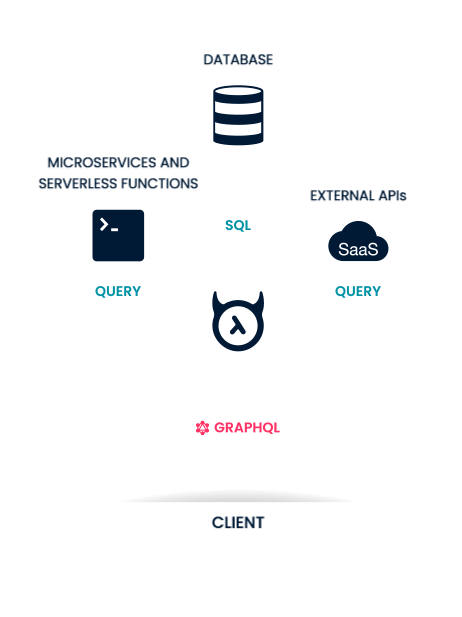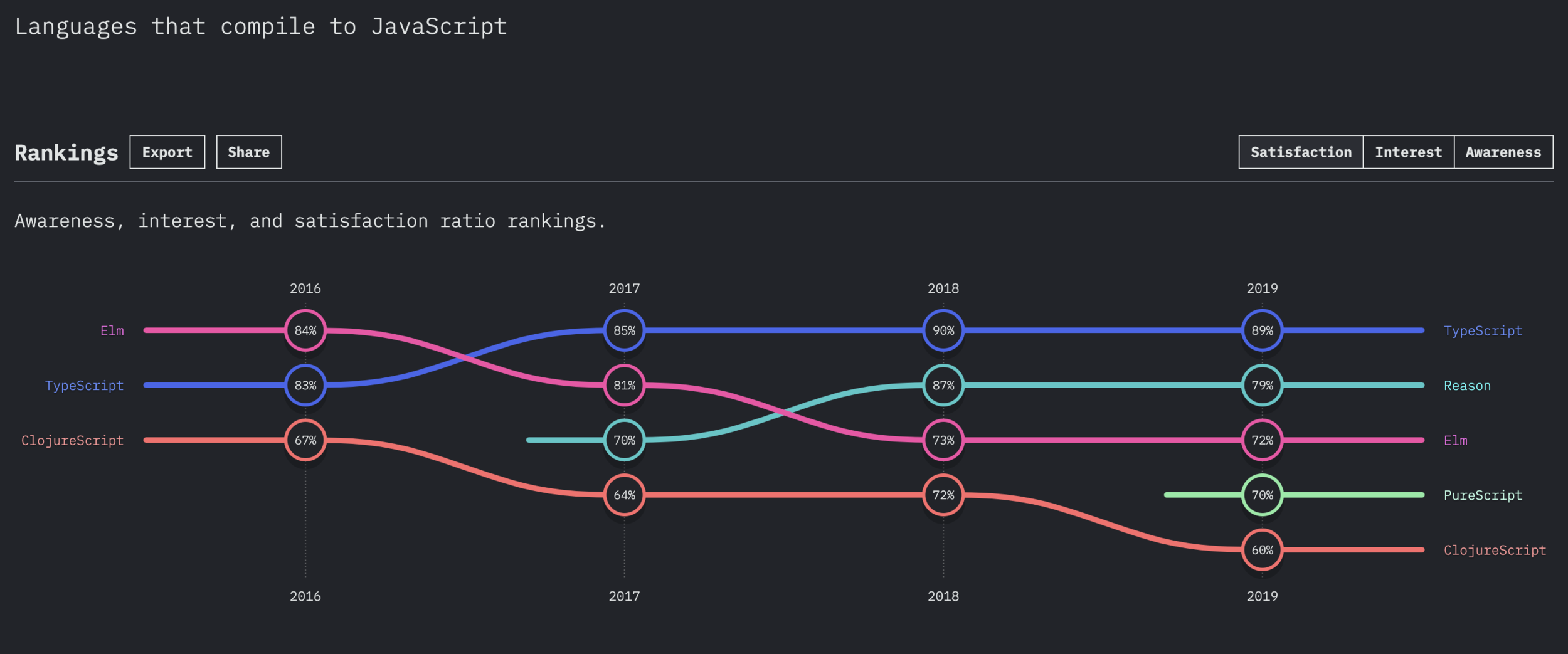Static Typing:
Which Language to Choose?

whoami?



- What is Hasura?
- Why do we want static typing?
- A walk through ReasonML, PureScript, TypeScript, and Elm.
- Comparison
- What did we choose and what's the plan?
Agenda

What is Hasura?

Why do we want
static typing?


JavaScript is not enough


null > 0; // false
null == 0; // false
null >= 0; // true








😱





Dynamic typing is not enough


Dynamic typing is great for fast prototyping, testing ideas, but...


...as a project grows, it's not enough anymore.



At some point, control becomes crucial.
Ease of refactoring in a big codebase



Easier onboarding


Easier onboarding

- What arguments does it accept?
- What value does it return?
- What external data does it require?
Our backend is written in Haskell


JavaScript as a build target

A walk through: ReasonML, PureScript, TypeScript, and Elm

Why these four options?






import React, { useState } from "react";
export const Form = () => {
const [name, setName] = useState("");
const [password, setPassword] = useState("");
const onNameChange = e => {
setName(e.target.value);
};
const onPasswordChange = e => {
setPassword(e.target.value);
};
return (
<form>
<input
type="text"
placeholder="Name"
value={name}
onChange={onNameChange}
/>
<input
type="text"
placeholder="Password"
value={password}
onChange={onPasswordChange}
/>
<button type="submit" onSubmit={handleSubmit}>
Submit
</button>
</form>
);
};
Login form example
ReasonML
- Rock solid type system and strong type inference.
- Immutable and functional by default, but it supports mutations and side-effects.
- Reason supports React with ReasonReact and JSX syntax.


[@react.component]
let make = () => {
let (name, setName) = React.useState(() => "");
let (password, setPassword) = React.useState(() => "");
let onNameChange = (e: ReactEvent.Form.t): unit => {
let value = e->ReactEvent.Form.target##value;
setName(value);
};
let onPasswordChange = (e: ReactEvent.Form.t): unit => {
let value = e->ReactEvent.Form.target##value;
setPassword(value);
};
<form>
<input
type_="text"
name="name"
value=name
onChange=onNameChange
placeholder="Name"
/>
<input
type_="password"
name="name"
value=password
onChange=onPasswordChange
placeholder="Password"
/>
<button type_="submit"> {React.string("Submit")} </button>
</form>;
};
PureScript
- PureScript has a decent ecosystem.
- Great type system; provides features such as: typeclasses, higher kinded types, row polymorphism, higher-rank types, and many more.
- It's a purely functional and strict language.


module Form where
import Prelude
import Data.Maybe (fromMaybe)
import Effect (Effect)
import React.Basic.DOM as R
import React.Basic.DOM.Events (targetValue)
import React.Basic.Events (handler)
import React.Basic.Hooks (ReactComponent, component, useState, (/\))
import React.Basic.Hooks as React
form :: Effect (ReactComponent {})
form = do
component "form" \_ -> React.do
{ name } /\ setName <- useState { name: "" }
{ password } /\ setPassword <- useState { password: "" }
pure
$ R.form_
[ R.input
{ onChange:
handler targetValue \value ->
setName \_ -> { name: fromMaybe "" value }
, value: name
, placeholder: "Name"
}
, R.input
{ onChange:
handler targetValue \value ->
setPassword \_ -> { password: fromMaybe "" value }
, value: password
, placeholder: "Password"
}
, R.button
{ type: "submit"
, children: [ R.text "Submit" ]
}
]

TypeScript
- Superset of JavaScript
- Optional static typing
- There are many ways to adopt TypeScript.
- Zero configuration support in many modern IDEs.


import * as React from 'react';
export const Form: React.FC = () => {
const [name, setName] = React.useState('');
const [password, setPassword] = React.useState('');
const onNameChange = (e: React.ChangeEvent<HTMLInputElement>) => {
setName(e.target.value);
};
const onPasswordChange = (e: React.ChangeEvent<HTMLInputElement>) => {
setPassword(e.target.value);
};
return (
<form>
<input
type="text"
value={name}
onChange={onNameChange}
placeholder="Name"
/>
<input
type="password"
value={password}
onChange={onPasswordChange}
placeholder="Password"
/>
<button type="submit">Submit</button>
</form>
);
};

Elm
- Purely functional language.
- Elm provides the ability to interoperate with JavaScript through ports and web components.
- A built-in architecture for organizing code makes managing data flow a breeze.


import Browser
import Html exposing (..)
import Html.Attributes exposing (..)
import Html.Events exposing (onInput)
main =
Browser.sandbox { init = init, update = update, view = view }
-- MODEL
type alias Model =
{ name : String
, password : String
}
init : Model
init =
Model "" ""
-- UPDATE
type Msg
= Name String
| Password String
update : Msg -> Model -> Model
update msg model =
case msg of
Name name ->
{ model | name = name }
Password password ->
{ model | password = password }
-- VIEW
view : Model -> Html Msg
view model =
Html.form []
[ viewInput "text" "Name" model.name Name
, viewInput "password" "Password" model.password Password
, button [] [ text "Submit" ]
]
viewInput : String -> String -> String -> (String -> msg) -> Html msg
viewInput t p v toMsg =
input [ type_ t, placeholder p, value v, onInput toMsg ] []
Comparison




Important points:
-
Interoperability with JavaScript
-
Learning curve
-
Low migration cost and easy setup
-
IDE support, ecosystem
Setup cost

Setup cost

ReasonML
3 steps:
npm install --save-dev bs-platform reason-react
{
"name": "your-project-name",
"reason": {
"react-jsx": 3
},
"sources": [
{
"dir": "src",
"subdirs": true
}
],
"suffix": ".bs.js",
"bs-dependencies": [
"reason-react"
],
"refmt": 3
}
Setup cost

PureScript
3 steps:
yarn global add purescript spago
yarn add -D purs-loader
spago init
spago install purescript-react-basic

Setup cost

TypeScript
6 steps:
yarn add -D typescript @babel/preset-typescript fork-ts-checker-webpack-plugin




{
"compilerOptions": {
"lib": ["es6", "dom", "es2017"],
"checkJs": true,
"allowJs": true,
"jsx": "react",
"allowSyntheticDefaultImports": true,
"strict": true,
"esModuleInterop": true,
"noEmitOnError": false
},
"exclude": ["node_modules"],
"include": ["src/**/*"]
}Setup cost

Elm
3 steps:
yarn add -D react-elm-components elm-webpack-loader{
"version": "0.0.1",
"type": "application",
"summary": "Elm <> Console",
"license": "Apache",
"source-directories": ["src/elm"],
"elm-version": "0.19.1",
"dependencies": {
"direct": {
"elm/browser": "1.0.0",
"elm/core": "1.0.0",
"elm/html": "1.0.0",
"elm/json": "1.0.0"
},
"indirect": {
"elm/time": "1.0.0",
"elm/url": "1.0.0",
"elm/virtual-dom": "1.0.0"
}
},
"test-dependencies": {
"direct": {},
"indirect": {}
}
}
Elm installed globally
Setup cost

Summary
JS interop

JS interop

module KnowMoreLink = {
[@bs.module "./KnowMoreLink.js"]
[@react.component]
external make: (
~href: string
~text: string = ?
) => React.element = "default";
};ReasonML
JavaScript in ReasonML
BuckleScript bindings

JS interop

ReasonML
ReasonML in JavaScript
import { make as getUser } from './User/index.bs';
const user = getUser();JS interop

PureScript
JavaScript in PureScript
exports.unsafeHead = function(arr) {
if (arr.length) {
return arr[0];
} else {
throw new Error('empty array');
}
};foreign import unsafeHead :: forall a. Array a -> a
Foreign import declaration

JS interop

PureScript
PureScript in JavaScript
import { button as Button } from './Button/Button.purs';
<Button>Submit</Button>JS interop

TypeScript
JavaScript in TypeScript
// Dropdown.d.ts
type Props = {
options: Array<{ content: string }>;
dismiss(): void;
position: 'bottom' | 'right';
};
declare const Dropdown: React.FC<Props>;
export default Dropdown;-
allowJs: true
- Declaration file for JS code

JS interop

TypeScript
TypeScript in JavaScript

JS interop

Elm
"JavaScript in Elm"
var app = Elm.Main.init({
node: document.getElementById('elm'),
flags: locale
});1. Flags
JS interop

Elm
"JavaScript in Elm"
2. Ports
var app = Elm.Main.init({
node: document.getElementById('elm')
});
app.ports.cache.subscribe(function(data) {
localStorage.setItem('cache', JSON.stringify(data));
});
app.ports.activeUsers.send(activeUsers);JS interop

Elm
Elm in JavaScript
import Button from './elm/Button.elm';
import Elm from 'react-elm-components';
<Elm src={Button.Elm.Main} />Migration cost


Migration cost
Mental model

Type soundness
- TypeScript is unsound by design
- Elm, PureScript and ReasonML guarantee more soundness

Type soundness
But... dynamic/static typing interop is unsound in all of these languages


Type soundness
Ensuring soundness in dynamic/static typing interop comes with a runtime cost


Ecosystem


Ecosystem

IDE support



- VS Code written in
TypeScript

Popularity on GitHub






Real world comparison



Real world comparison

Real world comparison
- It is biased
- These are different implementations
- There's a big margin for error

Bundle size in KB


Bundling time in ms

What did we choose and what's the plan?











We needed good JavaScript interop





We needed straightforward setup and good IDE support





We needed a low migration cost


We chose TypeScript
Hasura Console is a big, opensource project

Hasura Console is a big, opensource project
Low migration cost allows to keep velocity high.

Hasura Console is a big, opensource project
Low setup cost allows to keep velocity high.
Smallest difference between languages won't scare contributors.

Gradually typed language fits our needs


Adoption plan









...but getting closer!









Summary
What will you choose?

We chose TypeScript.
It's not about the language
It's about the context



